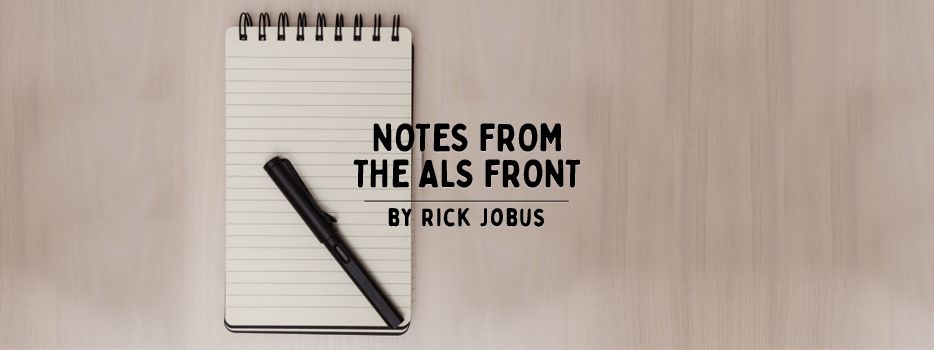Toward a Better Understanding of the Legend of Growing Pains
Written by |

“Oh yes, I am wise, but it’s wisdom born of pain. — “I Am Woman,” Helen Reddy
“Gain from pain” is not a new concept. The notion can be traced back several millennia to “The Ethics of the Fathers: Pirkei Avot,” a book of the Jewish Mishnah. It presents moral advice and insights of the leading rabbinical scholars of different generations, such as Ben Hei Hei’s, “According to the pain is the gain” (5:21).
Robert Herrick emphasized the premise in the 17th century when he wrote, “If little labour, little are our gains: Man’s fortunes are according to his pains.” Jane Fonda popularized the “no pain, no gain” refrain in her workout videos of the early 1980s. Friedrich Nietzsche’s adage, “That which does not kill us makes us stronger,” advances the postulation to the extreme.
Last Saturday marked the anniversary of the delivery of my ALS diagnosis. As in years past, I reflected upon some existential questions. I pondered who I am, what I am, where I am, and why I am. ALS factors into the answer to each.
During this contemplation, my mind kept circling back to the day that news was conveyed. Remembering that surreal event, I couldn’t help but draw comparisons between my former self and today’s much-altered version. With Reddy’s lyrics spinning in my brain, I wondered if the pain of ALS has borne anything remotely positive in my life.
Physically speaking, the answer is an obvious, resounding no. Immediately prior to ALS’ intrusion, I stood 6 feet, 2 inches tall on a fit, 205-pound frame. Now my maximum head height — achieved by adjusting my power wheelchair to its loftiest position — is 5 feet, 5 inches, and I weigh in at a bony 175 pounds. I had a projecting voice, yet now a whisper may challenge me. Once I could run, jump, swim, and dance. Today, I can’t pick myself off the floor.
That leaves the “wisdom” side. I am not so presumptuous to claim that I am wise in any absolute sense. But the lyrics resonate with me on a relative basis. I believe that I’ve become wiser since ALS began inflicting its pain. At a minimum, my outlook on life is through refined optics.
Take happiness, for example. I’ve gone from thinking — a la the Declaration of Independence — that it’s an elusive pursuit to believing it to be conditional happenstance. I no longer selfishly chase it via possessions or escapades. Rather, I wait for factors to align themselves. I am happy more often now than ever in the past. The two circumstances that generate the most delight in me, and for the longest duration, are when those in my life are happy, and whenever I am consciously in the presence of God.
A similar overhaul has taken place for me in the category of what I worry about. I just don’t fret about much anymore. I am content with whatever political party is in power. I am indifferent to who is the reigning champion in this or that sport. As long as my family’s security and well-being are predicted beyond my death, what else is important? In that regard, I am reminded of a shared moment with my dad.
In 1985, my father was dying from an aggressive, inoperable brain tumor. On a Sunday that November, he and I were watching our favorite football team on TV. After a series of stirring plays, I noticed my dad was unanimated. Sensing my bewilderment, he explained, pointing to his head, “Do you think I care about that with this going on? Let’s talk about how you kids will do when I’m gone.”
Happier and not as prone to stress and anxiety? Those are but two of multiple gains I’ve experienced coincidentally with the ALS chapter of my life. Is it possible the suffering that ALS has imposed is somehow partially offset, or even has strengthened me?
Doubtful, says clinical psychologist Noam Shpancer. Writing on the subject in Psychology Today, he states that “the bulk of psychological research on the topic shows that, as a rule, if you are stronger after hardship, it is probably despite, not because of the hardship.” He concludes with “Tender love and care toughen you up, because they nurture and strengthen your capacity to learn and adapt—including learning how to fight, and adapting to later hardship.”
I buy that. I have received, and continue to enjoy, an ample supply of tender love, for which I am eternally grateful. In fact, whereas pre-ALS I took most blessings for granted, I now appreciate and am thankful for everything bestowed upon me, from the profound to the subtle.
In that spirit, mindful that I am of closing the books on one more year of ALS, allow me to borrow from Kevin Bacon’s character Chip, in the movie “Animal House”:
“Thank you, sir, may I have another?”
***
Note: ALS News Today is strictly a news and information website about the disease. It does not provide medical advice, diagnosis, or treatment. This content is not intended to be a substitute for professional medical advice, diagnosis, or treatment. Always seek the advice of your physician or other qualified health provider with any questions you may have regarding a medical condition. Never disregard professional medical advice or delay in seeking it because of something you have read on this website. The opinions expressed in this column are not those of ALS News Today or its parent company, Bionews, and are intended to spark discussion about issues pertaining to ALS.






Cindy
Spot on about the 2 occasions for happiness. My reveal date was on Jan 13. I remind myself that the Marian apparitions at Fatima were on the 13 th of the month. May through October. Close enough for me.